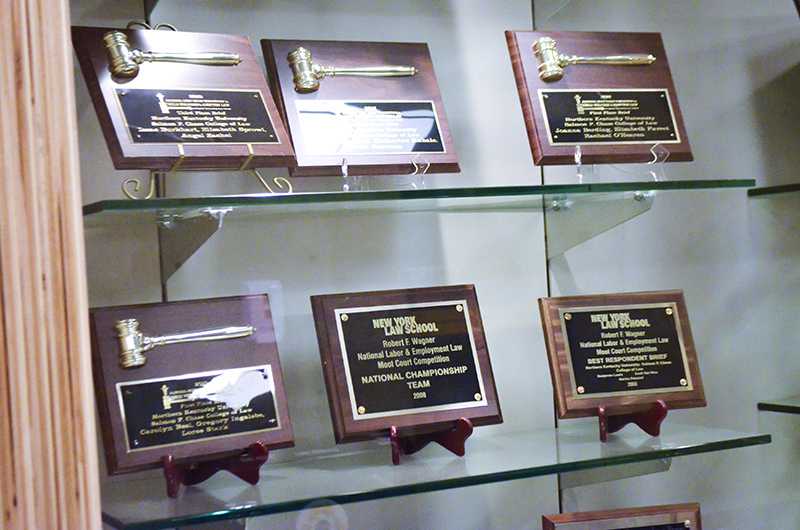Lunsford Academy says it will create well-rounded ‘Renaissance Lawyers’
Awards that Chase Law has earned. Dean Standen hopes that the Lunsford Academy will bring more attention to Chase.
A Chase graduate has given back to his alma mater in a big way. To be specific, one million ways.
Bruce Lunsford, a 1974 graduate from the Salmon P. Chase College of Law, has donated $1 million to the school in order to establish the W. Bruce Lunsford Academy for Law, Business + Technology.
The academy, which has accepted ten students in its first year, aims to create “renaissance lawyers,” according to Chase Dean Jeffrey Standen.
“So much of what lawyers do is changing,” Standen said. “Today’s lawyer has to be a little more gifted and a little more versed in disciplines that are related to law but are not exactly law than back in the day.”
Standen said that the three focuses of the Lunsford Academy will be technology, leadership, and business quantitative methods.
The Honorable Shira Scheindlin, judge for the Southern District of New York for the U.S. District Court System, who will be speaking at the program’s official inauguration on Sept. 23, said that the biggest change in the practice of law has come from technology.
“With these younger lawyers, coming fresh out of law school, I’ve never seen a closing argument that didn’t incorporate a Powerpoint presentation. You don’t see that with older lawyers,” Scheindlin said.
She said that this lack of knowledge was a disadvantage.
“If you’re uncomfortable with modern technology, you’re better off retiring,” Scheindlin said.
Overall, technology has helped the practice of law, Scheindlin said, although it does come with its disadvantages.
“You used to be able to have a single train of thought without having it interrupted,” Scheindlin said. “Now, with smart phones, there’s always something going on. You’re either getting an email or a call from a client and you have to answer it right away, and it fractures your attention.”
Standen said that a background in technology is invaluable for today’s lawyers.
“We are responding to what lawyers need to be able to do nowadays,” Standen said.
Because so many records that lawyers’ clients need help protecting are kept digitally, lawyers entering the practice need to understand how this technology works, and all the privacy laws and other laws that come with digital files and all sorts of other technology.
Standen said that knowledge in leadership and business methods are also necessary for today’s lawyers.
“As lawyers in this country, one’s expected to, and is often asked to take on leadership roles right away,” Standen said. “This was the case years ago, we’d get our J.D.s [Juris Doctorate] and we’d go off to practice law. Well, then, a couple of months, and we’re on the school board of some new town and a year later we’re the mayor.
Standen said that this trend in lawyers getting hired on in executive positions has been a relatively recent one.
Rob Manfred, the next commissioner for Major League Baseball, and President Geoffrey Mearns were two of the examples Standen gave for lawyers in executive positions.
Partially due to this trend, Scheindlin said that lawyers are expected more and more to have a specialization.
Scheindlin said, “More and more nowadays, you see lawyers coming out of law school and asking each other, ‘What’s your specialty?’” Instead of having a more general knowledge about all of the things that go on in their practice, Scheindlin said, lawyers are only focusing on narrow areas, such as banking or sports law.
Scheindlin and Standen will both be speaking at the academy’s inauguration on Sept. 23, which takes place in the Griffin Hall Digitorium from 2-5 p.m.


